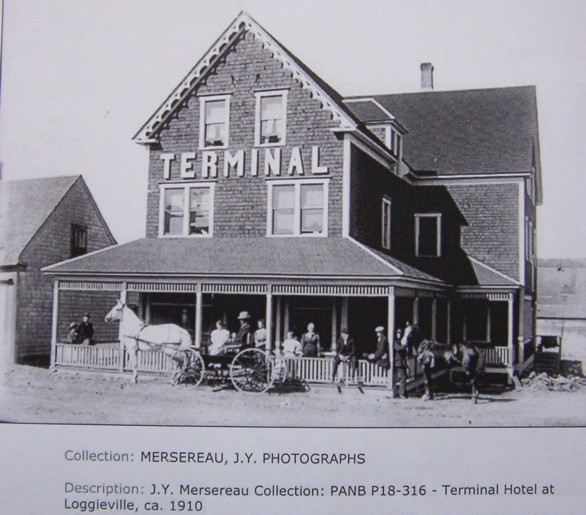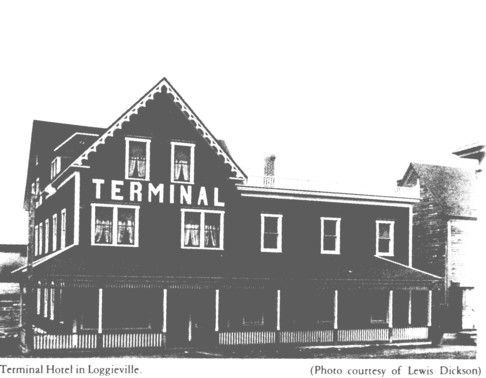

The Terminal Hotel was a landmark in Loggieville for over fifty years. In its prime the hotel served as a "home away from home" for commercial travellers. Loggieville was the terminus of the railroad and the travellers would stay over at the Terminal Hotel and hire a horse and wagon or a horse and sleigh to make their down river calls.
Randolph Cox, who ran the hotel from 1904 until the late twenties, also operated a livery stable. He had ten or fifteen driving horses and several work horses.
Sometimes the salesmen displayed their wares in the sample rooms opposite the hotel. Edward J. Russell remembers going as a child to see the Christmas toy line displayed by J. A. McMillan of Saint John. His father, H. M. L. Russell operated a fish business and the large three-storey store built by his father, Frank W. Russell in 1912. The store was run by three generations of Russells. "Changing circumstances in the village necessitated the closing of the store in 1953," Mr. Russell said.
Randolph Cox rented part of the W. I. Loggie farm and kept cows to supply milk for the hotel. There was a large barn on the property where the baled hay was stored to feed the cattle.
Mr. and Mrs. Ben Williston of Hardwicke took over the running of the hotel in 1930. The Williston family remained there until the mid-forties.
Following the Willistons came Adam Stewart of Tabusintac, a farmer, woodsman and mill owner. Miss Mary Broderick and Miss Thyrza Murdoch also managed the hotel for the A. & R. Loggie Company.
The last people to fill this position were Mr. and Mrs. William Turk.
Finally, the Loggie Company turned the building into apartments. The loss of the railroad activity, mills, industry and the emphasis on cars brought about the end of the hotel business in Loggieville as in most other villages.
Peter Mazerolle was commissioned to demolish the building in the late 1950's.
The history relates that during renovations after the purchase, the roof was raised two more storeys to make a three-storey hotel and the ground floor area was extended. Later another section was added to the east side of the building.
A Loggieville resident tells of a terrible storm in 1907 during renovations that all but levelled the hotel.
In 1909 another wing was added to provide a ladies' parlour.
It is interesting to note that in 1906 the famed Canadian Indian poetess Pauline Johnson, stayed at the Terminal Hotel and gave a recital of her poems in the Temperance Hall.
Several of the local people contacted were of the opinion that the Terminal Hotel was never a store but was built as a hotel by Alexander Gibson, the lumber baron and industrial tycoon who built the Marysville cotton mill. Indeed, Alexander Gibson was connected with the establishment of the railway and it is said that he fell in love with Loggieville and envisioned it as another St. Andrews with great tourist potential. He built a cottage in Loggieville and called it "Angels Retreat."
In the local papers of 1903 there are references to guests staying at the Loggie House. Perhaps this was the original name of the Terminal Hotel. Certainly some confusion surrounds the building previous to 1904.

The MacIntyre Hotel, originally the home of George MacIntyre, is mentioned frequently in the newspapers of the early 1900's. It was purchased by O'Leary and Montgomery and it was run by Albert Fraser. In 1937 and John Nagle Company of Boston bought the hotel and in 1943 the W. S. Loggie Company bought it and rented it as a residence.
James MacMurray ran an inn on the corner of St. Andrews and Water Street. It had a large bar-room and also a good sized livery stable. In later years the building was relocated and used as a residence.
According to Parker Manderson there were also several boarding houses in the village. "The mill workers very rarely stayed at a hotel," he said, "They were lodged in boarding houses."
An item in a local paper of October 2, 1902 states, "The A. & R. Loggie Boarding House is completed. Their boarders are now moving into it. The building is supplied with hot and cold water."
"One of the most delightful places in God's beautiful world to spend a summer holiday is to be found at Loggieville, at the mouth of the Miramichi River, the terminus of the Canada Eastern Railway. There is no place like it or to equal it for persons who for a few weeks or months wish to recruit their lost energy of body or mind, or who desire quiet pleasure and enjoyment.
"A steamboat runs daily trips from Chatham down the river and along the shore of the Gulf, calling at points of interest for the pleasure seeker, giving a return ticket for twenty-five cents.
"The business of the village is principally carried on by Robert Loggie and brothers. Their can and box making factory, their canning of berries and fish, their immense salmon refrigerator, also their large well-filled store are all objects of interest to the visitor. At present there is a large party from Fredericton and Marysville, spending their holidays at Loggieville, and so delighted are they with the place, and so satisfied have they become with themselves under the invigorating ''elixir of life," sea air without fog, that they have christened their present domicile "Angels Retreat.''
(Acknowledgements: Charles Whitty, Parker Manderson, Edward J. Russell, Rev. C. J. Mersereau, George Loggie, Mrs. Fred Kelly, Mrs. Eleanor Hay, Mrs. George Bernard, M. H. Dickson, James Fraser and Carlyle Symiest in "Loggieville on the Miramichi"; Bill McKinnon, N. B. Archives).
(Northumberland News, May 20, 1981)